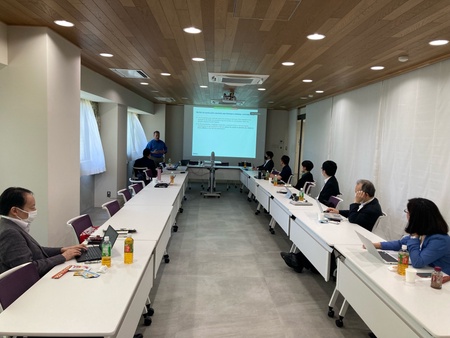On June 3rd and 4th, legal researchers from Kobe University, University of Aberdeen, Hokkaido University, Nihon University, Tokai University, and the British Institute of International and Comparative Law (BIICL) met to discuss the initial research findings of Professor Roy Partain (Aberdeen) into the sources, causes, and modelling of the ‘anticommons’, a type of coordination problem over multiple complementary inputs, such as multiple bureaucratic approvals in a regulatory approval process or multiple holders of IP rights that need to be coordinated in medical research. Other Aberdonians present at the conference included PhD candidate Hikari Saito, alumni Dr Constantinos Yiallourides, and previous visiting scholar Professor Akira Saito.
The three-year joint research project is funded by both JSPS and UKRI; its goals are to provide new methodologies for investigating the legal institutions surrounding emergent pandemics to enable better policy development and efficacy in future periods of pandemic outbreaks. (See more here)
Partain delivered two two-hour presentations at the conference:
- One research presentation traced the historical antecedents, many previously unrecognized before this research project, of the legal concepts known as ‘anticommons’ and ‘tragedy of the anticommons’. Because previous models were spread across many isolated silos of research in game theory, operations research, political sciences, and in various schools of legal theory, this novel recognition of similarly focused scholarship from different disciplines enables a much deeper set of research tools as the literatures can now be connected and unified into a single field of study.
- A second research presentation focused on a novel mathematical approach to modelling legal institutions, working with established toolsets from operations research. Previous efforts in the literature to model anticommons had involved economic models, primarily those derived from Cournot’s two-hundred-year-old models of competitive/complementary monopolies. The new methods wholly avoid the use of microeconomics models to better avoid the rhetorical and utilitarian assumptions that accompany those models.
Upcoming research conferences will focus on the research outputs of the six teams on the project, as they work to identify and characterize where anticommons environments are presented in multiple Japanese legal institutions and on the potential approaches to preventing or overcoming risks to policy efficacy posed by those anticommons environments. Future steps of the research project will include Professors Greg Gordon and Abbe Brown and Dr Titi Adebola, for their expertise in commercial law and intellectual property law; they have been members of the research team since the original research proposal.


